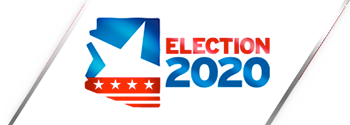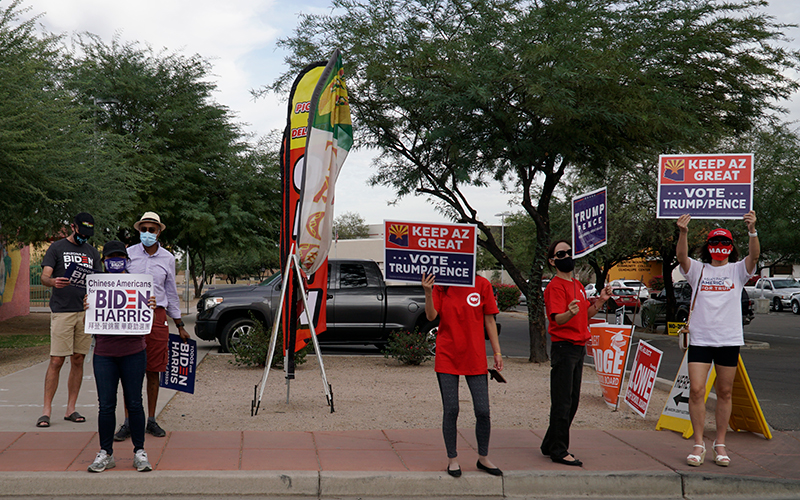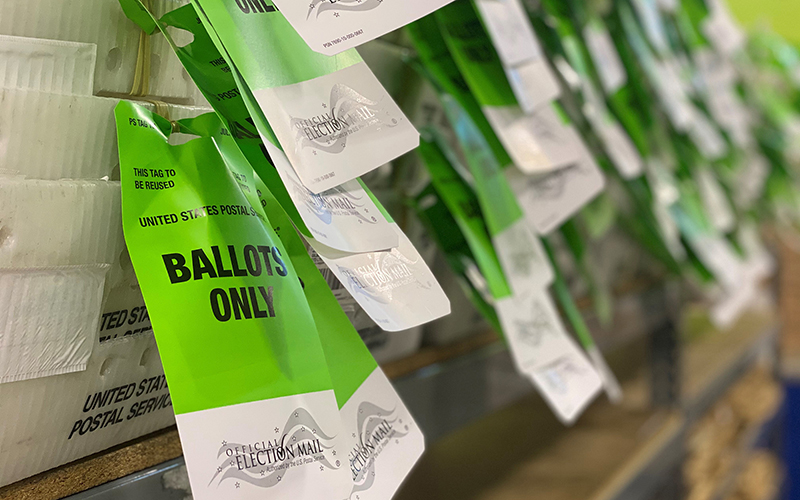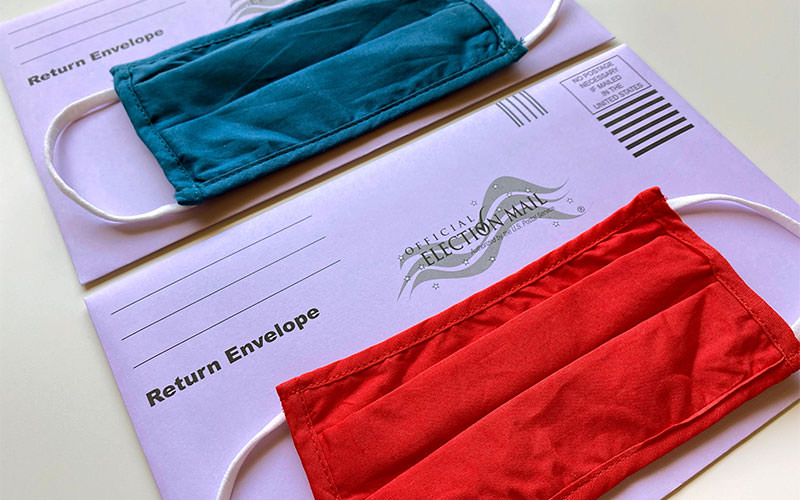PHOENIX – Election Day finally has arrived after months of controversy over COVID-19, the resulting economic freefall and impassioned demands for social justice stemming from the deaths of Black Americans at the hands of police.
Arizona emerged as a battleground state in the 2020 presidential race, spurring dueling visits from the candidates and attracting millions of dollars in television ads – all against a background of anxiety over insinuations about the integrity of an election in which more than 2.3 million Arizonans already have voted.
Election Day traditionally is the day Americans cast their ballots in person, but in Arizona, early and mail-in ballots have been pouring in since Oct. 7, outpacing 2016 totals. By Friday, more than 2.3 million Arizonans already had voted.
First-time voter Alexis Calvillo of Mesa cast an early ballot last weekend at a voting center in Mesa. She was relieved “to get my vote out there and make a difference.”
The unprecedented early and mail-in voting, attributed to fears of the pandemic and high interest in the election, means Americans likely won’t know the official winner of the presidential election – and even statewide and local races – on Election Day. Instead, voters should prepare for a week of trickling-in results. It took nearly a week in 2018 for Democrat Kyrsten Sinema to be elected Arizona’s first female senator over Martha McSally, who later was appointed to John McCain’s Senate seat.
McSally now is battling former astronaut Mark Kelly to keep that seat.
The two threw barbs at one another in their only debate. McSally waffled when asked whether she was proud of President Donald Trump, who endorsed her campaign.
“I’m proud to be fighting for Arizona every single day,” McSally said, leading the moderator to paraphrase her remarks as supporting the president.
Kelly attacked McSally on her stances on medical coverage and the economy.
The Senate race and Trump’s battle against former Vice President Joe Biden brought national attention to traditionally red-state Arizona, which many politics watchers say could turn purple or even blue this year. Polls have Biden and Kelly ahead in Arizona, but more recent polls show those leads have tightened, according to FiveThirtyEight.
Trump won the state in 2016 by just less than 4% over Hillary Clinton. Arizona has not elected a Democrat for president since Bill Clinton won reelection in 1996.
Other candidates and issues on the ballot include Proposition 207, the latest attempt to make recreational marijuana use legal in the state. The initiative also would allow people who have been charged or convicted of minor marijuana offenses to petition for expungement of their criminal records. Arizona voters approved the use of medical marijuana in 2010.
Opponents say Proposition 207 would make marijuana available to teenagers and endanger drivers. They also note that tax revenue from marijuana sales would support law enforcement and community colleges rather than K-12 schools; advocates say funding will shore up needed programs and relieve stress on crowded prisons by reducing prosecution for minor marijuana offenses.
Proposition 208, known as the Invest in Education Act, is rooted in the Red for Ed movement in 2018, which staged mass teacher walkouts to demand better funding for public schools.
Proposition 208 would add a 3.5% surtax to the current rate of 4.5% on income exceeding $250,000 for single earners or $500,000 for couples. The revenue would be distributed among teachers, retention programs, staff salaries, classroom support and related programs. Opponents contend the tax would harm small businesses, and they argue that the proposition lacks oversight on how funds are spent.
Also catalyzing voters this year are social justice movements spurred by police killings of numerous Black Americans, including George Floyd, Breonna Taylor and, in Arizona, Dion Johnson. Maricopa County will choose to reelect Sheriff Paul Penzone or his Republican opponent, Jerry Sheridan, who was a longtime top aide to Sheriff Joe Arpaio.
In addition to all nine members of Arizona’s delegation in Congress, voters will choose members of the Legislature, decide whether to retain state and county judges in Maricopa and three other counties, and, in some Phoenix area school districts, decide on school-budget overrides.
Arizona voters have long embraced early voting by mail – decades before COVID-19 safety concerns collided with traditional in-person voting.
But controversy has dogged early voting since Trump called into question the integrity of mail-in ballots and the U.S. Postal Service, the installation of fake drop boxes in California and an attempt to illegally harvest ballots in Arizona. Critics say that summerlong slowdowns in mail deliveries began after a major Trump donor was chosen postmaster general.
Postal Service officials have sent assurances that ballots will be delivered in time to be counted, and TV ads touting the service’s integrity and effectiveness have run in Arizona and elsewhere.
Arizona’s status as a repeated coronavirus “hot spot” drew markedly different reactions from Biden and the president, who have collectively made several visits to Arizona, with the final one just last week by Trump.
Trump and his surrogates, including daughter Ivanka Trump and Vice President Mike Pence, have led in-person, mainly maskless visits and gatherings to tout economic stimulus help to businesses during the pandemic. Trump has visited Arizona five times since the start of the year, including last week in Goodyear, Prescott and Bullhead City.
I’m NOT just running against Joe Biden—I’m running against the left-wing media, the Big Tech giants, and the wretched Washington Swamp. They have nothing but disdain for you and your values—get out and VOTE to #MAGA! pic.twitter.com/ZYiv9biLvX
— Donald J. Trump (@realDonaldTrump) October 28, 2020
Biden and Kamala Harris, the first person of Black and Indian descent to become a vice presidential candidate, also campaigned in Arizona in person but during social distanced events. They touted the endorsement of Cindy McCain, the widow of longtime Sen. John McCain, and what they thought needed to be done for business owners.
One in five small businesses have closed.
More than 25 million Americans are on unemployment.
Millions are at risk of losing their homes.But President Trump doesn’t seem to care. He only cares about how he and his wealthy friends are doing.
— Joe Biden (@JoeBiden) October 11, 2020
Trump’s flurry of rallies, without enforcement of social distancing or mask protocols, came at a time when COVID-19 cases are surging again in Arizona, with 666 new cases reported Monday alone.
The COVID-19 pandemic led to attempts to extend voter registration in Arizona for three weeks, but the Arizona Supreme Court ruled to limit the extension to Oct. 15, which still gave Arizonans about 10 more days than in previous years.
Who wins and what ballot measures are approved may hinge on get-out-the vote measures that are continuing until the polls close at 7 p.m. Tuesday. Voter registration records show Republican outnumber Democrats in Arizona, but registered independent voters – nearly 1 out of 3 – also will make a difference.
Voters still can drop off mail-in ballots at any drop box or voting location from 6 a.m. to 7 p.m. Tuesday. Find voting locations and drop boxes here.
Reporter Allie Barton contributed to this report.
 Want more on the 2020 elections? Cronkite News, Arizona PBS and Indian Country Today have teamed up to bring you comprehensive election coverage. Click here for more.
Want more on the 2020 elections? Cronkite News, Arizona PBS and Indian Country Today have teamed up to bring you comprehensive election coverage. Click here for more.



